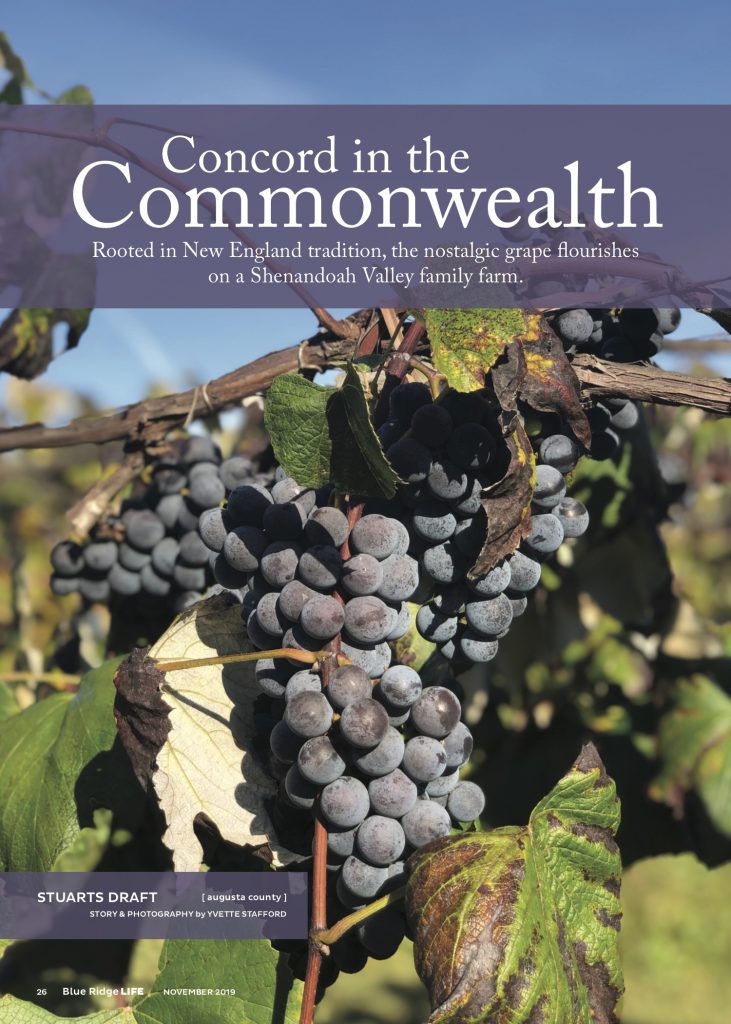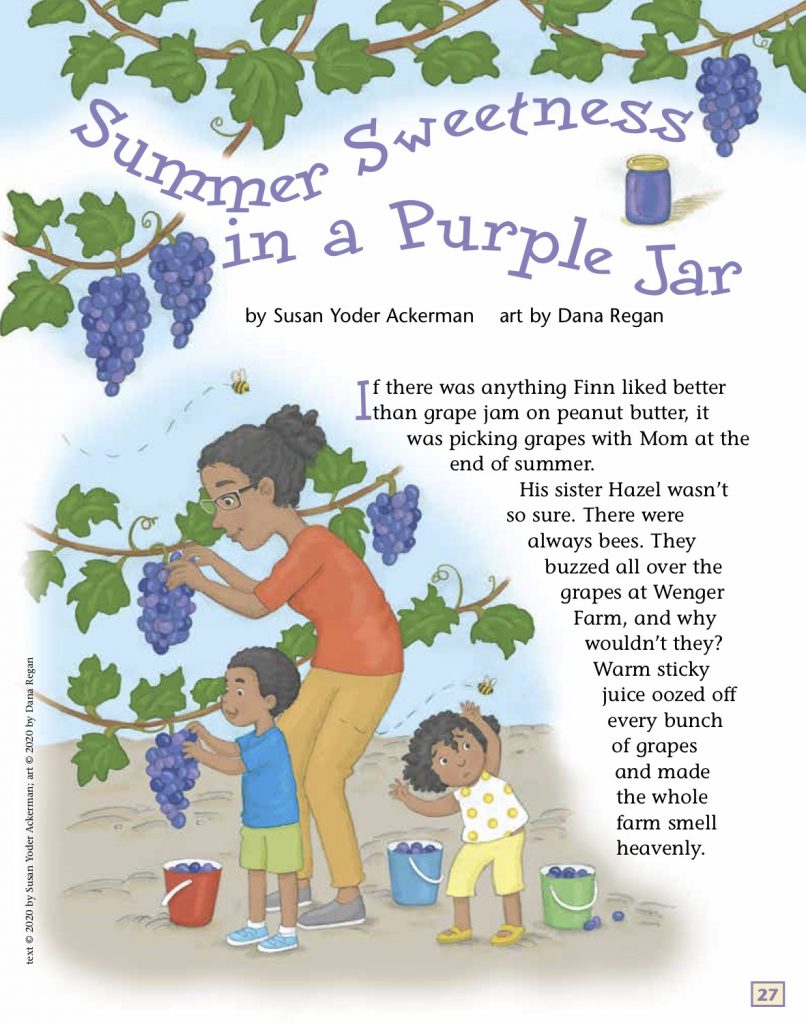“Concord in the Commonwealth: Rooted in New England tradition, the nostalgic grape flourishes on a Shenandoah Valley family farm,” story and photography by Yvette Stafford, was published in the November 2019 edition of Blue Ridge LIFE Magazine.

“Concord in the Commonwealth: Rooted in New England tradition, the nostalgic grape flourishes on a Shenandoah Valley family farm,” story and photography by Yvette Stafford, was published in the November 2019 edition of Blue Ridge LIFE Magazine.

“Summer Sweetness in a Purple Jar” was written by Susan Yoder Ackerman and illustrated by Dana Regan. It was published in the February 2020 edition of CLICK Magazine.
View a PDF of the full story, here.

Posted with permission by the author and publisher.
FRESH PICKED GRAPES
peck (10 lbs.) $ 18.50 $1.85/pound
½ bushel (20 lbs.) $ 37.00 $1.85/pound
1 bushel (40 lbs.) $ 64.00 $1.60/pound
PICK-YOUR-OWN GRAPES
peck (10 lbs.) $ 13.00 $1.30/pound
½ bushel (20 lbs.) $ 24.00 $1.20/pound
1 bushel (40 lbs.) $ 44.00 $1.10/pound
5 bushel or more $ 40.00 $1.00/pound
Fill the bottom layer of a 3-piece steamer with water. Put washed grapes in the top of the steamer. Cover with lid. Cook on medium heat on stovetop until juice starts to accumulate in the middle portion of the steamer.
When enough juice has accumulated to fill a jar, hold a canning jar with an oven mitt under the drain valve on the center portion of the steamer. (Or alternatively, put the jar on a stool below the steamer so that the hose reaches into the jar.) Open the value and allow juice to fill jar. Leave 1/4 inch headspace for pints and quarts.
Continue steaming the grapes to remove all the juice, and fill jars as juice accumulates. Frequently and carefully check the bottom layer of the steamer to refill water as needed.
Process jars in a boiling water bath for five minutes.
1 bushel grapes makes 15-20 quarts concentrated juice. Drink concentrated, or dilute with water or seltzer and sweeten to taste.
Place one to two cups grapes in a quart jar and add ½ cup sugar. Fill the jar with hot water, seal, and process in boiling water bath for 5 minutes.
1 bushel grapes makes 50-75 quarts dilute juice. Not as rich of flavor as the concentrate made from the kettle or steamer method, but much faster and less mess.
Put washed grapes in a large kettle and crush them. Add only a small amount of water to keep from sticking. Cook the grapes until the skins pop off. Cook at a low boil. Strain the juice, either through cheese cloth bag or a strainer. Put in canning jars and process in a boiling water bath for five minutes.
Sweetener may be added before sealing or when ready to use. Diluting this juice 2 parts juice to 1 part seltzer water with a squeeze of fresh orange makes a refreshing summer drink.
1 bushel grapes makes 15-20 quarts concentrated juice. Dilute to taste.
Good to the last drop: After juice is removed from the cooked grapes, put remaining pulp through a vegetable strainer or push through a fine sieve with a spoon to remove the seeds. Use this thick pulpy juice in Concord jam, pie or tapioca recipes.
We sell grapes direct from our farm in season, at local farmers markets and farm stands, and through produce distributors. See the list below.
Wenger Grapes farm stand
Stuarts Draft Farm Market
Agriberry farm stands.
Possible Grocery Stores (not available in 2020):
Greenwood Gourmet Grocery in Crozet, VA
Crozet Market in Crozet, VA
Whole Foods
Food Lion
Martins
H-Mart
Yes, we offer quantity discounts. See our PRICES, and please inquire for quantities over 2,000 pounds and for wine orders.
Because of the high humidity and temperatures during the late spring and summer months here in the eastern United States, it is more difficult to control fungal diseases like downey mildew, powdery mildew, and black rot. The primary insects pests include Japanese Beetle and Grape Berry Moth. We refer to the Virginia Tech Spray Guide for American hybrid grape varieties for our spraying. We have found over the years that watching the weather and spraying at critical times allows us to get by with spraying less often and with less spray material. We attempt to do a more thorough job of spraying early in the season. When this is done, we have found that we do not need to spray a number of the later season sprays that would result in residue buildup on the berries. Typically, our last sprays are put on mid to late July, and our harvest begins in early September. This provides 4-8 weeks of rains and sunlight to the bunches before they are harvested.
We strive to learn more about how to minimize the use of sprays on the grapes and to use materials that are safer for ourselves, our customers, and the environment.
We offer a few educational tours and grape tastings each year. Ask early to reserve a date for your group.